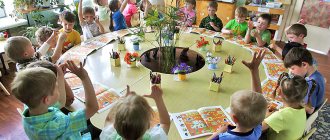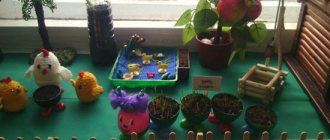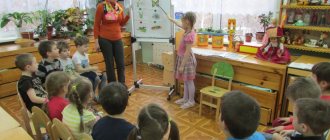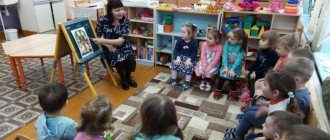Environmental project “Young ecologists”
author: Silaeva Anna Vyacheslavovna
teacher GBOU School No. 536 DK9
Environmental project “Young ecologists”
Project on environmental education of preschool children.
Project name:
"Young ecologists".
Relevance:
People living in the modern world of society have many problems. But perhaps one of the most acute and pressing is the problem of environmental conservation. We are already accustomed to conversations that the world is on the brink of an environmental catastrophe, that every day more and more new species of plants and animals are disappearing on Earth. We physically suffer from air, water and soil pollution. We have a good command of the culture of behavior in society, but we do not always know how to behave correctly in relation to nature. Sometimes there is a feeling that children treat living objects of nature as inanimate objects. Sometimes a child is delighted at the sight of a flower or a butterfly and at the same time can madly crush an ant running along the path. Why does an emotionally responsive child have so much coldness and indifference? Isn't it from us adults? After all, sometimes parents themselves are an example of environmental incivility: dad broke a branch and brushes away mosquitoes. But the teacher’s position on this issue can change this situation. Communication between children and nature, organized by the teacher, the content of knowledge accessible to the age of children arouses sustained interest, stimulates the desire to care for nature and protect it. Therefore, in the context of the global environmental crisis that humanity is experiencing, there is a need for continuous environmental education, the main goal of which is to form a new type of attitude towards nature based on nurturing an individual’s ecological culture. Preschool age can be considered as the initial stage of environmental education, since it is during this period of life that the child acquires the foundations of personal culture, its basis, corresponding to a wide range of universal human values.
The formation of the foundations of ecological culture in a preschool educational institution can be carried out in various forms: environmental studies, observations of natural phenomena, in the process of caring for plants, specially organized game-based learning situations, targeted excursions, holidays, etc. A special place is occupied by integrative classes that involve a combination of various types of activities, including motor, play and creative.
Problem situation:
To teach children, together with their parents, to love the nature of their native land, its past and future. Make sure that children and adults try to change their attitude towards nature and behavior towards it.
Goal setting:
Only through joint interaction with the family and different forms, methods and techniques of work: observations, conversations, environmental games, reading fiction with environmental content, including work in nature in everyday life, can we talk about the formation of an environmental culture in preschool children.
Objective of the project:
Formation of environmental culture in children, knowledge about their native land, education of a conscious - caring attitude towards nature.
Main objectives of the project:
- Formation of a system of elementary environmental knowledge accessible to the understanding of a preschool child about his native land.
- Create a positive emotional background that will facilitate the child’s acquisition of knowledge about his native land.
- Development of cognitive interest in the natural world of the native land and the ability to reflect this in artistic and productive activities.
- Formation of initial skills and habits of environmentally literate behavior that is safe for nature and for the child himself.
- Fostering environmental knowledge, love for nature, and personal responsibility for its preservation.
- Involving parents in cooperation with the kindergarten in matters of environmental education of preschoolers.
Project type:
- According to the dominant method: practice-oriented;
- By nature of content: child + family + nature;
- By the nature of the child’s participation in the project: participant from the inception of the idea to the receipt of the result;
- By the nature of contacts: different age groups, in contact with family;
- By number of participants: frontal, group;
- Duration: long-term.
Number of participants:
children (junior group, senior group, preparatory group), physical education teacher, speech therapist, parents of students, group teachers.
Project duration:
1 year.
Project date:
September - August
Form of joint activity:
cooperation.
Project implementation stages.
Preparatory stage:
- Selection and analysis of popular science and fiction literature on this topic.
- Determining goals based on the interests and needs of children.
- Planning upcoming activities aimed at implementing the project.
Main stage:
- Conducting a series of classes, excursions, observations.
- Interaction with parents aimed at introducing them to project activities.
The final stage:
- Leisure activities for all groups.
- Design of seasonal exhibitions with crafts.
- Design of a photo exhibition dedicated to the native land.
Contents of activities to implement the project.
| FORM OF CONDUCT | TOPIC, CONTENT | THE DATE OF THE |
| Classes | Junior group, senior group, preparatory group “living and inanimate nature” (see Appendix No. 1) | Monthly |
| Observations | Junior group, senior group, preparatory group “living and inanimate nature” (see Appendix No. 2) | Monthly |
| Excursions, walks |
| Winter Autumn Spring |
| Ecological weeks |
| Spring April November May |
| Outdoor games | “At the Bear in the Forest”, “Hen and Chicks”, “White Bunny”, “Crested Hen”, “Geese-Geese”, “Owl - Owl”, “Cat and Mice”, “Mushrooms”, “Pike and Crucian Carp” ", "On a flat path...", "One, two, three, run to the tree", "Homeless hare", "Cunning fox", "Catch a mosquito", "Fishing rod", "Wind and leaves", "Hares and wolf" , “Migration of Birds”, “Frogs”, “Two Frosts”, “Spider and Flies”, “Catching Butterflies”, etc. | Monthly, throughout the day |
| Game exercises and games - relay races | “Horses”, “Penguins”, “Crossing the Stream”, “On the Bridge”, “Funny Bugs”, “Find Yourself a Mate”, “Bear Cubs”, “The Worms Let’s Go for a Walk”, “Spiders”, “From Mound to Mock” , “Cold - hot”, “Between snowballs”, “Who is faster to the snowman”, “Figures”, “Ride on a sleigh”, “Exactly on target”, “Snow carousel”, “From piece of ice to piece of ice”, “The sea is worried ", "River and Ditch", "Along the Path on One Leg", "Gardeners", "Plant Potatoes", etc. | Monthly |
| Didactic games | Junior group - “What is this weather called?” - “Find the same leaf” - “What kind of bird is this?” - “Find the same animal and name it” - “Describe, we will guess”, etc. Senior group — « Which plant is gone?”, “Where are the snowflakes”, “Our favorites”, - “Where does it ripen”, “Flies, swims, runs”, “Flower shop”, “Choose what you need”, - “Tops and Roots”, “Do the Right Thing.” — “Name the plant”, “Wonderful bag” Preparatory group — “Nature and man”, “Name the plant with the right sound”, “What grows in the forest”, “Find a leaf like on a tree”, “Where does anyone live”, “When does this happen”, “The third wheel”, “Yesterday, today , tomorrow”, “What kind of insect is this”, “Tell me what you hear”, “Earth, fire, water”, “What happens in nature”, “Who lives where”. | Monthly, throughout the day Monthly, throughout the day |
| Leisure activity | Junior group Senior group Preparatory group | |
| Exhibitions of children's works together with parents | Seasons | Autumn winter spring Summer |
| Photo exhibition | "The beauty and wealth of my land" | Spring |
| Making feeders for wintering birds, together with parents | All groups “Take care of our little friends” | Winter |
| Reading poems, proverbs and sayings, fiction | Living and inanimate nature | Monthly, throughout the day |
| Design of stands for parents | All groups "Nature is our home" "Seasonal Changes" | Quarterly |
| Questioning parents | “Environmental education of children” “Use of fiction in the family” | |
| Speech therapy classes with children | senior group, preparatory group “Use of natural material in speech therapy work” | Monthly, |
APPENDIX No. 1.
TOPICS OF CLASSES IN ENVIRONMENTAL EDUCATION.
Junior group.
- What autumn gave us.
- Kitties.
- Leaf fall, leaf fall, the old garden is falling asleep...
- A trip to the zoo.
- Where does the sun spend the night?
- Cat and kitten.
- Fruits of fruit trees.
- The wind is a breeze.
- How do animals prepare for winter?
- Winter came.
- Winter in the forest.
- Wild animals.
- Let's help the bunny.
- Big and small stars.
- Who lives next to us?
- Sunny bunnies.
- Trees and shrubs on our site.
- The rain sings a song.
- Six-legged babies.
- Pets.
Senior group.
- Watching a turtle.
- Consideration and comparison of vegetables and fruits.
- Conversation about pets.
- Conversation about bread.
- Conversation “The Wonderful Apple”
- Compiling a descriptive story “River, river, river.”
- Conversation about pets.
- Conversation about bread.
- Conversation “The Wonderful Apple”
- Compiling a descriptive story “River, river, river.”
- "Meet the Wolf."
- Looking at indoor plants.
- Conversation about snow.
- Ecological quiz “Nature connoisseurs”.
- Conversation “Winter in the forest.”
- Conversation "Plant as a living being."
- “What does a person need a nose for?”
- "Acquaintance with animals of hot and cold countries."
- “Our smart assistants are sense organs.”
- Conversation “How many interesting things happen in winter.”
- “We have animals as guests”
- Cuttings of indoor plants.
- “What and how a person eats.”
- “Ants are the orderlies of the forest.”
- Ecological fairy tale "Stream".
- "Doctors of the Forest"
- Final conversation about spring.
Preparatory group.
- Nature and man.
- Gifts of autumn.
- Where do frogs spend the winter?
- Leaf fall, leaf fall - yellow leaves are flying...
- Journey to the autumn forest.
- The cranes are flying away.
- How animals prepare for winter.
- Nature and us.
- Planet Earth is in danger.
- Autumn has come, brought eight weather...
- Six-legged babies.
- Meeting winter.
- The underground riches of the earth.
- Which branch is the baby from?
- Who protects the environment.
- Young ecologist.
- Wintering birds.
- The corner of the planet where we live.
- Domestic and wild animals.
- Fauna of the polar regions.
- Plants and life on Earth.
- We are all inhabitants of the planet.
- Forest and man.
- The birds have arrived - they have brought spring.
- Getting to know reptiles.
- Plants near us.
- Plant kingdom: herbs.
- Earth Festival.
- Who is the boss in the forest?
- Seasons.
- Russian birch.
- Healthy food.
- Hello, summer is red.
APPENDIX No. 2.
TOPICS OF OBSERVATIONS ON ECOLOGICAL EDUCATION.
Junior group.
- Watching fish, weather, birds, wind.
- Observing seasonal changes in nature.
- “Autumn is coming”, rowan in autumn, observing autumn leaves.
- Observing the sun, the sky.
- Watching from the window as daylight approaches.
- Autumn clothes. Signs of autumn. Leaf fall. Spruce in autumn.
- Observation of a kitten, cat.
- Watching the rain from the window.
- Maple in autumn. Leaves on the trees.
- "Wind, clouds, clouds."
- Watching the dog.
- “Evening is coming from the window.”
- Monitoring the weather conditions.
- “The first ice on the puddles”, the first snow, snowfall.
- Observing birch trees in November.
- Observing the work of a teacher in a corner of nature.
- "Clothes in winter."
- Observation of the evening sky, the starry sky.
- Trees in November.
- Frost on the trees.
- Moon in the evening sky.
- "Winter landscape".
- Observing the work of a janitor in different seasons.
- “Colored snowman” Properties of snow. Behind the color of snow.
- Observation of the snowy sky, snow cloud.
- "Winter morning". Snowdrifts. Frost on the windows.
- "Evening city landscape."
- Bird watching at the feeder. Wintering birds.
- Observing the shadow.
- Sprouting onions in a group.
- Willow in winter. Tree and bush in winter.
- "Colored Ice." Ice.
- Watching sunbeams.
- Watching the snow melt.
- "Buds on the trees." The first signs of spring.
- Reflection of the sun in puddles.
- Snow in early spring, properties of ice.
- Observation of tree pruning. Primroses. The first streams and puddles.
- Insects.
- Rainbow watching.
- Flowering trees. Blooming flowers.
Senior group.
- Observation of wildlife: insects; birds, their habits, wintering and migratory birds; for earthworms; leaf fall, field of tree seeds; the beauty of the winter landscape; spring change in nature; flight of poplar fluff; diversity of flora; coloring of plants, plants - barometers; for animals.
- Observation of inanimate nature: length of day, precipitation, wind, sky, sun, air, clouds; clothing for children and adults in different seasons; footprints in the snow; formation of icicles; puddles.
- Consideration: perennial and annual plants; flower seeds; trees and shrubs (differences); buds after leaf fall; leaves, their color, shape; puddles on the asphalt; footprints in the snow; insects; blooming trees; medicinal plants; flowers in the flowerbed.
Preparatory group.
- Monitoring seasonal changes.
- The sun is a source of heat and light.
- Observation of autumn trees.
- Observation of leaf fall.
- Watching migratory birds.
- Observing the wind, clouds, rainbows, thunderstorms.
- Observation of snow, snowfall, ice, blizzard, snowflakes.
- Watching footprints in the snow.
- Observation of conifers, trees and shrubs.
- Observing the work of a janitor.
- Observation of hail, drops, melting snow.
- Observing the flower garden.
- Observation of plants.
- Insect observation.
- Watching the dog.
- Why does the change of day and night occur?
- Observing the altitude of the sun.
Environmental project “Young ecologists”




